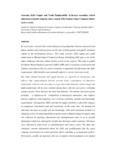| dc.description.abstract | In recent years concerns have arisen about growing disparities between education and
labour market needs with new focus on the roles of both quantity and quality of human
capital in the development process. This study assesses skills supply and youth
employment at Mumias Sugar Company in Kenya, identifying skills gap as one of the
major challenges that face labour market growth in the country. This study is guided
by Labour Market Analysis Approach (LMA). LMA refers to measures of education and
training requirements that are used to translate occupational classifications into skills
requirements. LMA identifies and continually adjusts to current short-term needs.
The study adopted demand and supply theories as espoused by Livingstone who
believes that supply-demand theories provide better explanations of education
employment relations and uses them to argue that underutilization of knowledge and
underemployment will be most common among those with the least power, including
younger people. These theories also hold that demand – the number and types of jobs
available – is influenced by “competition, technological innovation, and conflicts
between employers and employees over working conditions, benefits and knowledge
requirements” (Livingstone, 2002) and that the supply of labour is altered by changes
in population, household needs and legislation. At the same time, the demand for
education increases as people seek the knowledge, skills and credentials needed in a
changing society. To understand labour market needs at Mumias Sugar Company, data
was collected on openings, placements and un/employment rates so as to provide
information which was analyzed for insights into shortages and/or surpluses. Shortages
were reflected in high levels of un/employment and salary scales. The data also
contained concrete information about the skills and qualifications that the sugar
company is looking for in certain positions which contribute to occupational profiles.
Particularly, profiles of employees who are secondary school graduates were studied so as to understand the skills they possess and were triangulated against skills required
by the company. Interviews were held with secondary schools graduates working at
Mumias Sugar Company in various positions to know a great deal about the scarcity
or abundance of both soft and hard skills and hiring practices. Findings indicate that
specific skills prioritised by MSC for employment include fabrication of bolts, and other
machines that could be used at the plant. This is especially in the factory where
breakdowns are common and some of the parts that breakdown may not be accessible
easily yet they need urgent repair and maintenance. Direct and intense interaction
between the workers and machines is emphasised in order to fully understand the
behaviour of the machines and fellow workers. The study concludes that whereas the
hard skills such as literacy and numeracy which are emphasised in secondary school
curriculum are desirable in Mumias Sugar Company, they cannot guarantee one any
formal employment. This is because such skills were found important only for further
tailor made training. | en_US |

